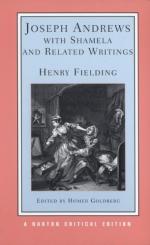|
This section contains 475 words (approx. 2 pages at 400 words per page) |

|
Section 15: Criticism page 458-494 Summary
In Morris Golden's "Fielding's Psychology and Its Relation to Morality", Fielding sees happiness as the reward for a good life and sees his function as providing romantic elements to prevent the reality of contemporary life from destroying the good. His subject and technique are related to his sense of psychological enclosure and he uses sex as a medium to demonstrate morality. Fielding cannot omit vices in his portrayal of real human nature as he insists evil is real and must be dealt with. Religion and reason shape the novel's passions toward the morally correct action. "The Reasoning Behind the Form of 'Joseph Andrews'" by Homer Goldberg discusses how Parson Adams seems to play a more dominant role than Joseph in the novel. Adams follows Cervantes' example of a character with the tendency to misconstrue the world around...
(read more from the Section 15: Criticism page 458-494 Summary)
|
This section contains 475 words (approx. 2 pages at 400 words per page) |

|




